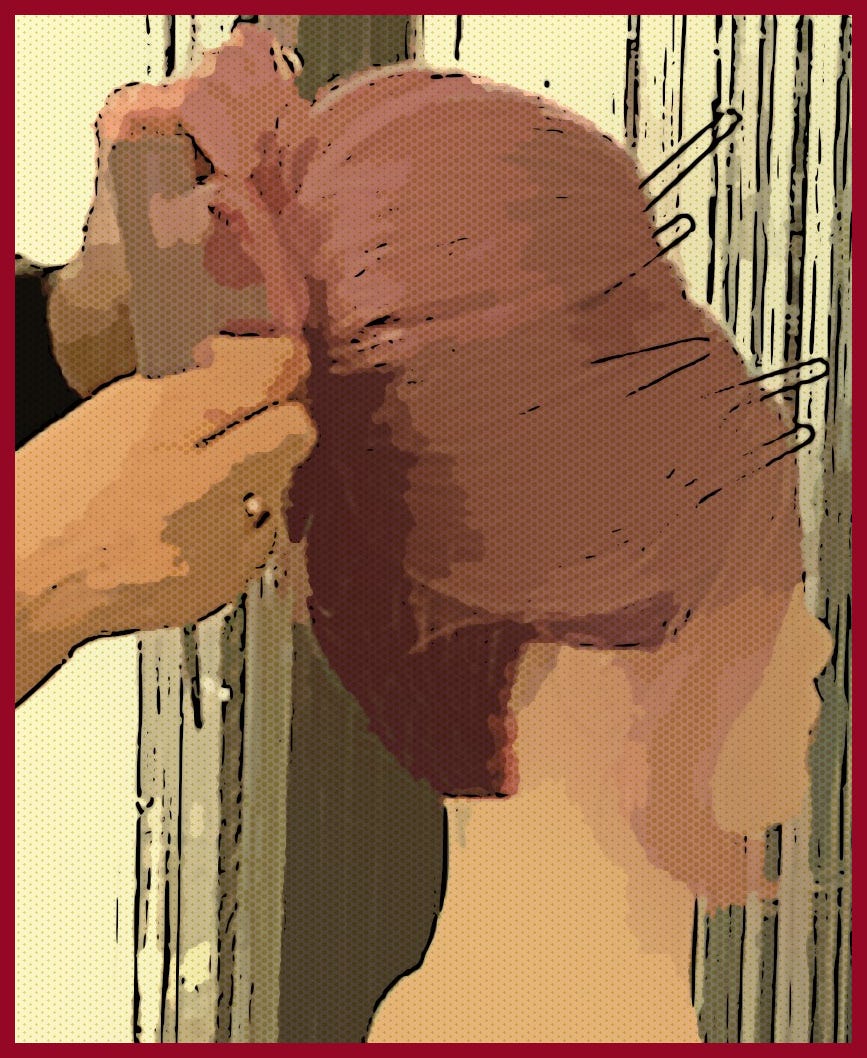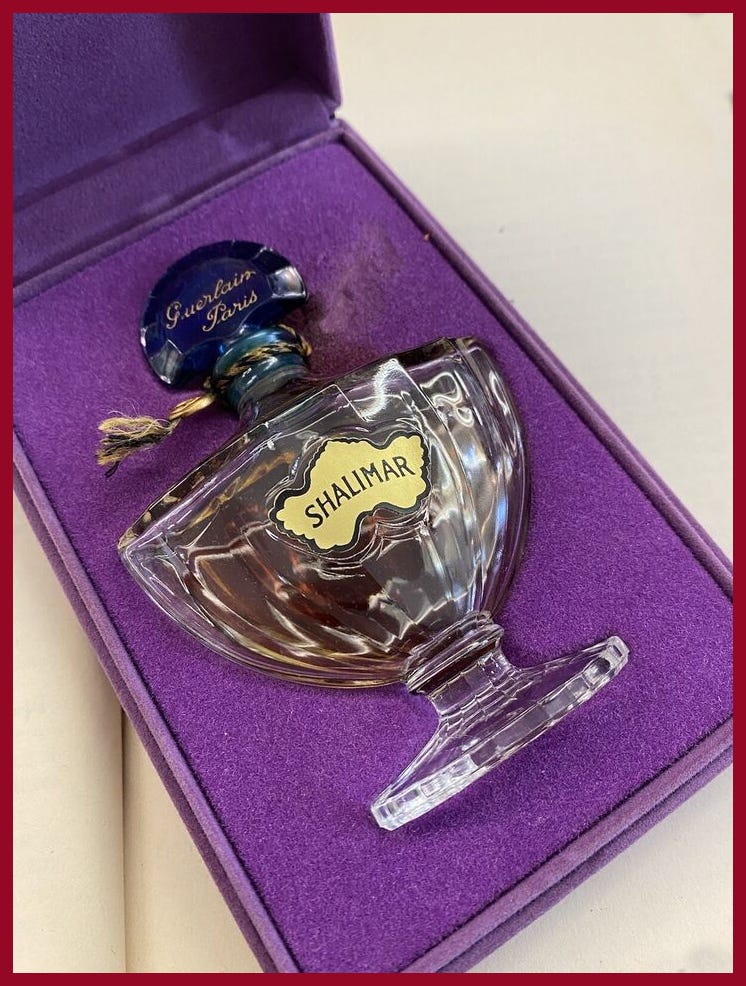It was Trixie and Vernon Henry’s twentieth anniversary today. They were going out to eat and needed to leave early so they could get back to the Beal Theater in time for the 7:00 showing of the new movie “Taras Bulba” starring Tony Curtis and Yul Brynner. They’d had been waiting to see it for six months. It took forever for movies to finally make it around to small towns like Dixon.
Trixie hated to take the time to stop for her mail because she was already running late after getting her hair fixed—henna-rinsed and back-combed within an inch of its life, with enough Spray Net to withstand a straight wind of 40 miles an hour. She’d already had to take the time to stop off at Hill’s Corner Grocery to get toilet paper, the kind her beauty operator Jeanne told her was the best for wrapping around her big bouffant to keep it in place when she slept. Jeanne said they carried the preferred brand at Hill’s, so after she left the beauty shop, she ran by the market and raced down the paper goods aisle to grab a roll. She scanned the shelves up and down and couldn’t find the brand she was looking for.
Fortunately, she saw Miss Hill’s grandson Frank Jr., who had just started working there after school. “Great,” she thought. “Little Frank’ll know.” Even though he’d known Trixie his whole life, he was still shy and awkward around her. Trixie couldn’t imagine why—she always tried to put him at ease. It never occurred to her that she might be a daunting figure to a teenage boy, even if he had known her his whole life. She was glamorous and flashy and sexy, funny, brash, good and honest to the core. There wasn’t a phony bone in her body. And she managed to maintain herself on a tight budget. Her only really extravagant indulgence was her perfume, her “signature fragrance” as she called it, which she wore liberally. The heavenly scent of Shalimar always preceded her actual arrival anywhere she went. She would act surprised tonight when Vernon gave her the purple velvet box that contained the bat-shaped bottle of perfume, just as he’d done every year for the last 19 years.
Anyway, she’d been in such a hurry at the market, she had inadvertently embarrassed Little Frank so bad she was sure he’d never get over it. In her haste to describe the exact toilet paper she was after, she blurted out, “You know, it’s the kind that doesn’t stick to your hair.” Little Frank turned beet red and retreated “to the back to check.” He never did return. Well, she felt like a dog for embarrassing him like that but couldn’t take the time to go fetch him and explain that she meant her hair-DO. Anyway, it had put her in a little bit of a bad mood and even more behind schedule.
So, when she pulled up and saw a parking spot right in front of the double doors of the post office, she crossed her fingers, hoping she’d be able to run in real fast and make a quick getaway without running into anybody too long-winded or with anything especially interesting to tell. The post office was the everyday meeting place of the small windy town, a kind of High Plains Rialto: “What news, y’all?” But sure enough, on her way out she was waylaid by—of all people—Sally Holt, possibly the most sanctimonious person in town. “Trixie! Trixie! Hi, Trixie!” Sally came running up to her, breathless and excited to visit. Trixie whispered under her breath, “Oh, Lord,” then answered Sally’s call with a tepid “Hi, Sally, how you doin’?” And for the next fifteen minutes, Sally held forth on just exactly how she was doing, not having enough sense to know that the question was rhetorical. As they were standing out in the wind, Trixie’s newly styled hair getting blown off her head, Mr. Ashlock drove slowly by in his blue and white, freshly washed and polished Chevy pickup. The women both raised a hand and waved. Clarence Ashlock nodded and lifted four fingers off the steering wheel to wave back as he went by.
Trixie knew she was really running late now because everybody in town knew they could set their watches by Clarence Ashlock’s afternoon trip over to Vera Van Camp’s—5:15 on the dot. Damn! How was she going to get loose from Sally without being downright rude? Sally’s gaze followed Clarence almost reverentially as he drove by. In a small town where everybody’s business was known and scrutinized, Mr. Ashlock was so well thought of, and his circumstances so well known, that almost no one judged him or Mrs. Van Camp for their daily assignation. Even though their relationship was as discreet and tasteful as was possible in a town the size of this one, there wasn’t a soul who didn’t know about it. But Sally naively thought of it as chaste and just practically verging on noble. That was the kind of cluelessness that really got on Trixie’s nerves, and just to goad Sally a little, she remarked as he passed by, “Well, I guess Clarence is about to get lucky.” To which Sally replied adamantly, “Oh, Trixie, they’re far too intelligent for that!” Trixie’d had it with her by now, and as she walked off, she shot back, “You don’t get too intelligent for that, Sally! I’ll see ya.”
So, what were the circumstances surrounding Clarence Ashlock? The neatly landscaped and immaculately kept house on the corner of Avenue B and Third that belonged to Clarence and Edna Ashlock at first glance looked like it would be inhabited by the perfect family, but it was cloaked in a forlorn pall. It was a pretty beige brick house with tasteful dark brown trim. There wasn’t a bit of chipped paint. Not a torn window screen. Not a leaf out of place. Even the roof was in perfect condition in a windy town where roof shingles took regular beatings.
The lawn was manicured, green and plush. So cool to look at, it invited little bare feet to come let the evenly trimmed blades of grass tickle between toes and offer a soft, verdant pallet for an afternoon nap. The flowerbeds were tended with such apparent care, the black soil so soft and worked, it seemed sure the flimsiest of plastic spoons could have scooped it up in carefully measured amounts to make mud pies. Inside the tended beds was a display of beautiful deep blue flowers with fragrance so sweet and profuse it could be smelled from the street if the breeze was just right. Only two houses in town had flowerbeds with those particular deep blue blossoms.
But the same breeze that wafted the sweet fragrance from the bed of hyacinths was the cause of a mournful sound from the back of the house. Two lonely swings hung on a long-neglected swingset in the backyard, and when the breeze blew just right, the swings issued pitiful squeaks and whines from the rusted chains that connected to the rusted hooks that held them up. Common maintenance for those swing parts involved the 30-to-40-pound weight of a laughing child plying back and forth, keeping the connections worn smooth and free of rust. No such child existed.
The limbs of a perfectly shaped and trimmed peach tree strained under the weight of plump fruit that begged to be picked and turned into pickled peaches and rich peach butter and to be eaten unwashed, the syrupy juice dripping off a little chin and onto the front of pink corduroy rompers worn by a happy little girl. No such little girl existed.
A fairy tale-inspired playhouse sat in the back corner of the yard. It had a high-pitched roof with cedar shingles and long windows with paned glass. Through the windows, you could see the floor was covered in pink linoleum. There was a table with tiny chairs and whimsical turtle-shaped stools that had hosted tea parties for a little girl and a small black-and-white terrier. The furniture was dusty now, and lonely, too. Sadly, beside the playhouse was a miniature headstone for the little dog, engraved with born and died dates that informed anyone interested to know that the little terrier had enjoyed longevity. On the other hand, there was a headstone at the cemetery engraved with angel wings. The born and died dates attested to the fact that the little girl had not enjoyed longevity, but a life cut so short as to take the breath away from anyone with a heart.
It’s a well-known fact that people grieve differently. The mother and father of an only child, just four years old, lost to a senseless, tragic illness. Each must go on living, but the living is different.
In this case, the mother goes out of her head. The present is unendurable torment, so she chooses oblivion, where she can escape to the sweet past of a happy family and doting motherhood. A place where she can still hear her angel girl’s sweet voice. A place where she can listen to the sounds in her head of the happy cries of her small girl as her stomach does flips when her daddy pushes her higher and higher on a bright red-and-green swingset or eavesdrop on serious dog-and-child conversations about how well this batch of mudpies turned out—“Didn’t they? Two extra scoops of Daddy’s dirt made all the difference.”
The father copes in his way to keep the status quo. He tends the house, the flowerbeds, the trees and paint and shingles and lawn and screen doors until fatigue dulls memory. Then, lonely and tired, he goes to the mother at exactly 4 p.m. every day. That’s when her floodgates threaten to open and bring back the unendurable present.
He tries once more to console her. He tells her again about the hyacinths, about the carefully tended bed he planted just for her and their little girl. The deep blue flower with the heavenly scent considered the most beautiful of all flowers by the ancient Greeks. He tells her about the Greek myth of Hyacinth, who died tragically like their own precious angel and how Apollo himself held Hyacinth in his arms giving him ambrosia and…and…as always, she is a blank. Her only response is to beg for the ambrosia that will send her into oblivion and the sweetness of the past. He knows and accepts and, dreading the alternative—the keening and pain of the present she cannot accept—he obliges and gives her the elixir that will send her into the only world she desires. Soon, she leaves him alone in his own solitary world. Again and again and again.
He feels her cheek and pulls up a crocheted throw over her shoulder. With her finally and safely at rest, he goes into the kitchen and makes a pot of percolated coffee like she used to make him. There aren’t many jars of his favorite pickled peaches left, so he saves those for another day and enjoys an oatmeal cookie with raisins with his cup of coffee. After checking on the mother once more before going out the door, he gets into his pickup and drives the three blocks to the only other house in town with the deep blue flowers in well-tended flowerbeds.
Vera Van Camp is in the kitchen making supper when she hears him drive up. She wipes her hands and goes to the door, eager to say hello and spend the late afternoon and early evening with the man she loves and has loved for years now, the broken-hearted father who has learned to handle his grief in his way. The whole town knows about Clarence Ashlock and Vera Van Camp. There’s no moral outrage or snorting remarks from even the most sanctimonious citizens. There is, though, a collective protective attitude instead for Clarence and his wife Edna. For a man and a woman who lost their only child. There is a soft-hearted understanding and compassion for a man, a father who does the best he can for a woman, the mother whose best doesn’t include him anymore.
Trixie and Vernon head home down Third Street about 9:30 and don’t notice Clarence pulling into his driveway. He gets out, carrying a tinfoil covered plate, no doubt a batch of oatmeal cookies, his favorite, or some leftovers from the meal he and Vera had shared that evening. Trixie and Vernon are still caught up in the epic tale of “Taras Bulba” and the nice evening they’d shared together. Trixie leans over and kisses her husband on the cheek. He can smell her signature fragrance, Shalimar, mixed with the cool evening air and the sweet smell of hyacinths.





















Share this post